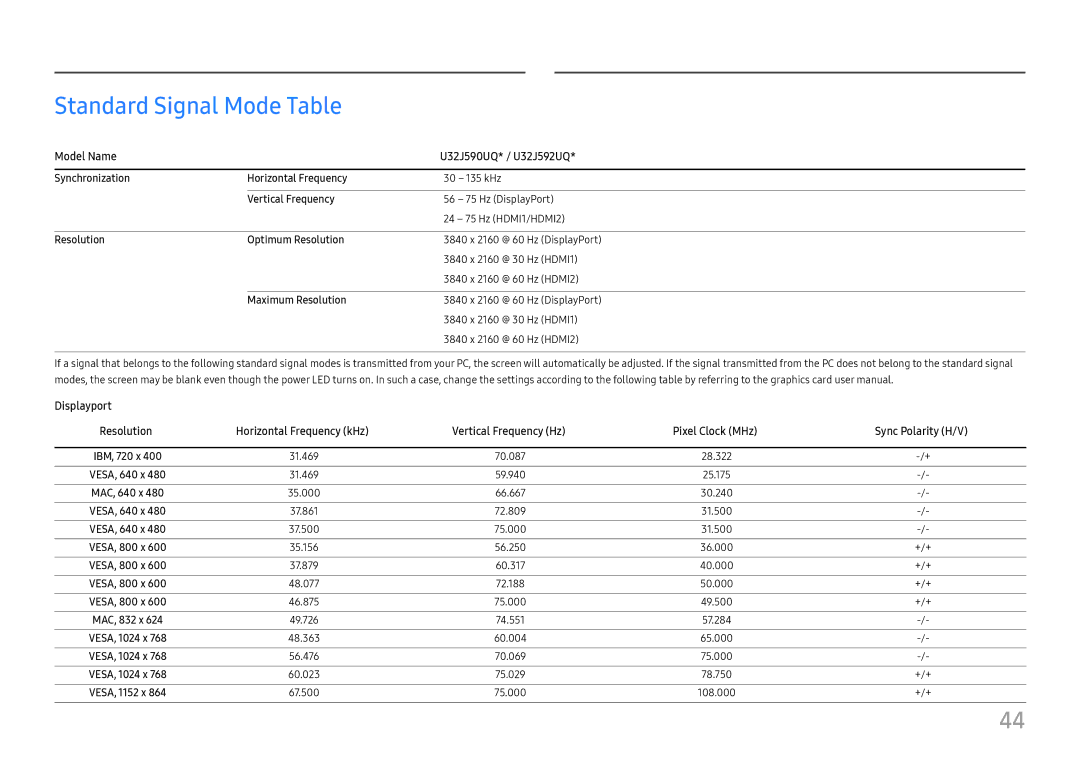
Standard Signal Mode Table
Model Name |
| U32J590UQ* / U32J592UQ* | |
|
|
| |
Synchronization | Horizontal Frequency | 30 – 135 kHz | |
|
|
| |
| Vertical Frequency | 56 – 75 Hz (DisplayPort) | |
|
| 24 – 75 Hz (HDMI1/HDMI2) | |
|
|
| |
Resolution | Optimum Resolution | 3840 x 2160 @ 60 Hz (DisplayPort) | |
|
| 3840 x 2160 @ 30 Hz (HDMI1) | |
|
| 3840 x 2160 | @ 60 Hz (HDMI2) |
|
|
|
|
| Maximum Resolution | 3840 x 2160 | @ 60 Hz (DisplayPort) |
|
| 3840 x 2160 | @ 30 Hz (HDMI1) |
|
| 3840 x 2160 | @ 60 Hz (HDMI2) |
If a signal that belongs to the following standard signal modes is transmitted from your PC, the screen will automatically be adjusted. If the signal transmitted from the PC does not belong to the standard signal modes, the screen may be blank even though the power LED turns on. In such a case, change the settings according to the following table by referring to the graphics card user manual.
Displayport |
|
|
|
|
Resolution | Horizontal Frequency (kHz) | Vertical Frequency (Hz) | Pixel Clock (MHz) | Sync Polarity (H/V) |
|
|
|
|
|
IBM, 720 x 400 | 31.469 | 70.087 | 28.322 | |
|
|
|
|
|
VESA, 640 x 480 | 31.469 | 59.940 | 25.175 | |
|
|
|
|
|
MAC, 640 x 480 | 35.000 | 66.667 | 30.240 | |
|
|
|
|
|
VESA, 640 x 480 | 37.861 | 72.809 | 31.500 | |
|
|
|
|
|
VESA, 640 x 480 | 37.500 | 75.000 | 31.500 | |
|
|
|
|
|
VESA, 800 x 600 | 35.156 | 56.250 | 36.000 | +/+ |
|
|
|
|
|
VESA, 800 x 600 | 37.879 | 60.317 | 40.000 | +/+ |
|
|
|
|
|
VESA, 800 x 600 | 48.077 | 72.188 | 50.000 | +/+ |
|
|
|
|
|
VESA, 800 x 600 | 46.875 | 75.000 | 49.500 | +/+ |
|
|
|
|
|
MAC, 832 x 624 | 49.726 | 74.551 | 57.284 | |
|
|
|
|
|
VESA, 1024 x 768 | 48.363 | 60.004 | 65.000 | |
|
|
|
|
|
VESA, 1024 x 768 | 56.476 | 70.069 | 75.000 | |
|
|
|
|
|
VESA, 1024 x 768 | 60.023 | 75.029 | 78.750 | +/+ |
|
|
|
|
|
VESA, 1152 x 864 | 67.500 | 75.000 | 108.000 | +/+ |
44
